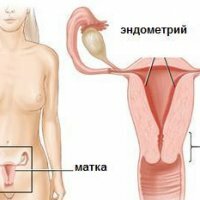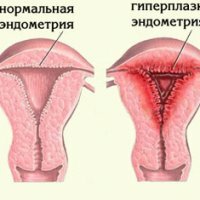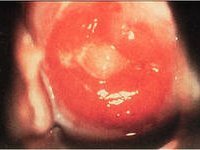buitenbaarmoederlijke zwangerschap
 The development of a fertilized ovum outside the uterine cavity is classified in gynecology as an ectopic pregnancy.Pathology, of course, ends with the death of the fetal egg, while there are several options for the development of events in the localization of the fetal egg outside the uterus.
The development of a fertilized ovum outside the uterine cavity is classified in gynecology as an ectopic pregnancy.Pathology, of course, ends with the death of the fetal egg, while there are several options for the development of events in the localization of the fetal egg outside the uterus.
Types of ectopic pregnancy
The location of the fetal egg in the fallopian tubes determines the classification of the pathology in question. Gynecologists distinguish several types of ectopic pregnancy:
- ovarian - the fetal egg does not go beyond the ovary and begins to develop in it;
- abdominal - the fertilized egg is "pushed out" by the ovary, but does not enter the uterus, but is attached to the peritoneum;
- trumpet - the embryo grows and develops directly in the fallopian( uterine) tube;
- is rudimentary - pregnancy develops in the rudimentary process of the uterus.Ovarian pregnancy is rarely diagnosed, but under certain circumstances it can fully develop and end with the birth of a healthy child - this is, of course, the exception that takes place to be. The
The ovary has a high level of elasticity of the organ walls, so the growth of the fetal egg continues for a long time absolutely asymptomatic for a woman - only the standard symptoms of the onset of conception are inherent.Therefore, timely registration with a gynecologist of a pregnant woman and conducting a full-fledged examination can be called the only possibility of early diagnosis of an ectopic pregnancy of the ovarian type.The ultrasound examination will show an empty uterine cavity and an overly enlarged ovary - this serves as an unconditional basis for diagnosing a pathological ovarian pregnancy.
Abdominal pregnancy is also considered a rare pathology, but recently it is increasingly diagnosed during IVF. In this case, it is a primary or secondary ectopic abdominal pregnancy:
- primary - the fertilized egg is attached not to the uterine cavity, but in the retroperitoneal space - on the omentum, intestine;
- secondary - initially developed tubal ectopic pregnancy, then there was a rupture / tearing of the fallopian tube and a fetal egg fell into the retroperitoneal region.
In the world there are cases of successful ending of abdominal pregnancy - healthy children were born by conducting an operative intervention.
Ectopic pregnancy, developing in the rudimentary department( horn) of the uterus , always ends with the death of the fetus.There is a hyperextension of the walls of the rudimentary horn, and then their rupture.
The tube pregnancy is most often diagnosed - from 100% of patients in 87% this type of pathological pregnancy is fixed.

Causes of
The main causes of ectopic pregnancy are pathological changes in the structure of the appendages, disruption of peristalsis( muscle activity, due to which the fetal egg advances into the uterus) of the fallopian tubes and changes in the properties of the fetal egg. But gynecologists identify several factors that may lead to the development of the pathology in question:
- Chronic inflammatory processes in the organs of the reproductive system.They lead to the appearance of adhesions, disrupt the structure of the ovaries and fallopian tubes, provoke ovarian dysfunction.Particular attention should be paid to infection with chlamydia - this infection leads in 60% of all cases to ectopic pregnancy.
- Contraceptives for intrauterine application - spiral.According to some experts wearing an intrauterine device causes the development of inflammatory processes in the uterus and its appendages( according to the principle - the body resists the presence of a foreign body).In addition, there are confirmed facts that the use of an intrauterine device as a contraceptive for more than 5 years in a row increases the risk of developing a pathological pregnancy by 5 times.
- Frequent abortions.Artificial termination of pregnancy is a sudden restructuring of the endocrine system of the body, a violation of the production of female hormones, the formation of adhesions, a violation in the peristalsis of the fallopian tubes.The more often a woman made abortions, the higher the risk of developing an ectopic( ectopic) pregnancy - a fact confirmed by research.
- Disorders of hormone production.First of all, we are talking about chronic endocrinological diseases, but long-term use of hormonal contraceptives can provoke imbalance.
In addition, ectopic pregnancy can develop as a consequence:
- malignant and benign neoplasm;
- infantilism of the uterus and appendages;
- of chronic endometriosis, which leads to the formation of adhesions;
- congenital abnormalities of the development of the organs of the reproductive system.
Gynecologists consider the risk of an ectopic( ectopic) pregnancy in women over the age of 35 at the first conception, and in the case of often endured stress, fatigue and nervous breakdown.
Signs of an ectopic pregnancy in the early stages of
It is generally accepted that the symptoms of an ectopic pregnancy are absent and it is possible to detect such a pathology only at the stage of rupture of the fallopian tube or during an early ultrasound study.But in fact, early symptomatology exists - it is important to "catch" pathological changes in the body in a timely manner.
First, a woman may not have a banal delay in menstruation, but a very meager manifestation of them.And, the delay can last several days, then there are bloody discharges of a non-intensive nature.
Secondly, a woman will feel the pains in the lower abdomen - this is a reaction to a stretching fallopian tube.Pain syndrome is aching, pulling character, there is irradiation in the lumbar spine and anus, which leads to the erroneous assumption of exacerbation of chronic adnexitis.
In general, official statistics make the following statements:
- the standard monthly delay in ectopic pregnancy is observed in 78% of women;
- pain syndrome with abdominal localization of various nature is present in 68% of women with an ectopic pregnancy;
- early toxicosis is diagnosed in 54% of women;
- enlarged mammary glands with a slight bit of soreness are noted by 36% of women with ectopic pregnancy.
When examining a woman, an ectopic pregnancy will manifest itself with the following symptoms:
- cyanosis and friability of the cervix;
- with palpation of appendages - slightly enlarged fallopian tube from the side where ectopic pregnancy develops;
- attempt to reject the uterus leads to the emergence of an intense pain syndrome.
A gynecologist will note a discrepancy between the size of the uterus and the timing of the last menstruation - this also gives rise to a suspicion of an ectopic pregnancy.But no expert will put the final diagnosis without a full-fledged examination of a woman - ultrasound, analysis for the content of progesterone( a hormone that preserves pregnancy), clarification of the content of hCG in ectopic pregnancy.
More detailed information on the symptoms of an ectopic pregnancy can be obtained by watching this video review:
Consequences of an ectopic pregnancy
Pipe abortion
This refers to the rejection of the fetal egg from the fallopian tube without rupturing the appendage. Pipe abortion is characterized by three main features:
- sharp pain in the lower abdomen - paroxysmal, has a "dagger" character;
- from the vagina appear bloody discharge;
- The usual menstrual cycle is broken - there is a delay in menstrual cycles.
Pain in the lower abdomen of an intense nature appears due to an attempt to push the fetal egg through the fallopian tube, and also because of the blood entering the retroperitoneal space - this acts irritatingly on the nerve endings.
The reason for the tubal abortion is a sudden pain that occurs with a certain periodicity, can irradiate to the area of the collarbone, lower back and anus.Pay attention: pain syndrome is greatly enhanced with sudden movements, coughing, sneezing and during the act of defecation.
Bloody discharge appears with constant regularity, does not have any smell and does not disappear even after taking hemostatic medicines.If the diagnosis is incorrect, a woman may be prescribed a mechanical cleaning of the uterine cavity, but even this measure does not stop the discharge.
Note: a woman may sluggishly ignore the indicated signs of tubal abortion, if the pain is not intensive, the bloody discharge does not cause discomfort.Should be alerted: hyperthermia( fever), general weakness, regular dizziness( against internal bleeding).
Rupture of fallopian tube
A rupture of the fallopian tube in ectopic pregnancy is the most serious complication that can result in death for a woman. This condition always occurs suddenly and has pronounced symptoms:
-
 strong, sharp, "dagger" pain in the lower abdomen;
strong, sharp, "dagger" pain in the lower abdomen; - sharp drop in blood pressure indicators;
- critical heart rate increase;
- appearance on the forehead and palms of cold sticky sweat;
- significant deterioration in overall well-being, down to loss of consciousness.
No examination of a woman in this condition is required - hemorrhagic shock, loss of consciousness and deafening pain in a previously diagnosed pregnancy are the basis for emergency surgical care.
Surgical treatment
Ectopic pregnancy is always an operative intervention. There are several types of surgical solutions to the problem:
- salpingoectomy - complete removal of the fallopian tube;
- salpingophotomy - an incision is made in the wall of the uterine tube, through which the fetal egg is removed;
- resection of the segmental tube - the fetal egg is cut out together with the pipe section, then the edges are sewn together.
Salpingectomy is performed in most cases, because an ectopic pregnancy is diagnosed too late, at 4-8 weeks, when the embryo release / death process is already beginning.Salpingotomy is the best option for those who are still planning a pregnancy, but on condition of early diagnosis of the pathology in question.Pipe resection is extremely rare and is an extraordinary operation, but usually succeeds.
Note: at the earliest time of ectopic pregnancy, it is possible to destroy the fetal egg and get rid of it without cutting / dropping the fallopian tube.To do this, through the vaginal vagina, Methotrexate is introduced into the tube, a medicinal preparation that literally dissolves the fertilized egg.
Important : this procedure is performed only under permanent ultrasound control.
After surgical treatment of ectopic pregnancy, a woman should undergo a rehabilitation period - it will be long.
Firstly, , it is advisable to undergo a full examination of narrow specialties doctors in order to find out the true reason for the non-admission of a fertilized egg into the uterine cavity.Only with the implementation of therapeutic measures in relation to infectious and inflammatory processes in the organs of the reproductive system can the development of a normal pregnancy be expected in the future.
Secondly , gynecologists recommend to undergo sanatorium treatment in the first 3-6 months after surgery - this will help restore and strengthen the body's immunity.
Thirdly, , gynecologists warn about the undesirability of pregnancy planning in the first 6 months after the surgery for ectopic( ectopic) pregnancy.The doctor can prescribe hormonal contraceptives - this will help restore the hormonal background and prevent unplanned conception.
Preventive measures
Ectopic pregnancy can not be predicted - there are too many factors that can lead to such a development of events. But doctors have developed specific preventive measures:
- since the beginning of sexual activity to visit the gynecologist regularly for preventive examinations and early diagnosis of inflammatory / infectious diseases;
- keep a calendar of the menstrual cycle and consult with a gynecologist for minor violations;
- timely and fully treat any pathology of the organs of the reproductive system, including inflammatory and infectious diseases;
- to plan pregnancy - for example, before conception to undergo a full examination of general and narrow specialties among doctors.
Ectopic pregnancy is considered a rather complex and dangerous pathology.But if medical measures were carried out at an early stage of pathology or when a fallopian tube was ruptured, competent measures were taken, the prognosis would be favorable.Modern achievements in medicine allow not only to save the life of a woman, but also will provide her with the opportunity in the future to have children.
More details on ectopic pregnancy - in video review:
Tsygankova Yana Aleksandrovna, medical reviewer, therapeutist of the highest qualification category.



